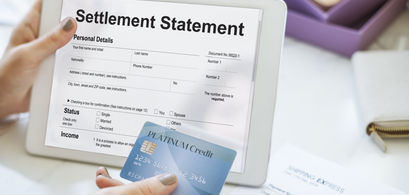One of the reasons merchants allow customers to pay with credit cards is they don't have to worry about collecting the money charged. That burden falls on the shoulders of the card issuing company. These same companies are experts at collecting money from customers, and they don't like to settle for anything less than payment in full.
How to Settle Credit Card Debt
When customers approach a credit card company about a repayment problem, the company is immediately on the alert. Approaching a company about a debt settlement plan should be a last resort, and only used when the alternative is filing for bankruptcy. The entire end-to-end process can have negative consequences when it comes to applying for future credit.
In this article, we're going to provide some information that will help individuals avoid problems by explaining how to settle credit card debt in an equitable or fair manner. As explained later, the negotiating process must be equitable, or the credit card company will choose bankruptcy over the payment offer.
Large Card Balances
Also known as debt work out arrangements and deferred payment plans, the ability of a consumer to repay the debt owed is oftentimes difficult for companies to really predict. The key to eligibility for such arrangements is really in the hands of the card issuing company. Individuals in truly dire financial straits need to supply accurate information to their creditors; thereby allowing them to make an informed decision.
Credit card companies are experts at managing risk. They do this all the time because they are in the business of extending credit to individuals. Unfortunately, not everyone wants to pay back the money owed, or has the resources to pay their outstanding balances.
Forgiving Debt
When faced with a situation where someone is not paying their credit card bills on time, or has stopped paying altogether, the card issuing company wants to make the right decision. They could decide to collect the amount owed with all the resources they have at their disposal. This is a very costly approach, especially if they don't collect the money owed.
They could also choose another option, which forgives a portion of the debt owed. If they believe only a portion of the debt will ever be collected, then debt forgiveness is a preference.
Like all businesses, credit card companies want to maximize their profits. They can collect all the money owed, none of it, or a portion of it. Their risk assessment will dictate what course of action they choose. However, they realize that even getting half of the money owed is better than getting none of it. If bankruptcy occurs, everyone loses.
Bankruptcy
The bankruptcy laws that are now in effect are tougher than they were prior to 2005. This process is painful for both the individual declaring bankruptcy as well as creditors. Before they're willing to start negotiating, a company needs to be convinced the account owner:
Is unable to make payments on outstanding debt, as demonstrated by recent payment patterns.
Does not have a lot of assets to lose, such as a home or a car, which makes declaring bankruptcy easier.
Doesn't have enough income to justify a reorganization of debt, as would occur in a Chapter 13 proceeding.
This second point is very important. If a credit card company believes they can get paid by liquidating the cardholder's assets through a bankruptcy proceeding, they might choose that route.
Credit Information
When filling out an application for a credit card, it is very likely the company was authorized to collect and inspect the applicant's credit reports. When an accountholder approaches them about a repayment problem, one of the first things they will do is to pull a credit report and examine the accountholder's credit history.
By pulling a report, the company will be able to see if the accountholder is staying current on their payments to other creditors. If they see a problematic payment pattern across all creditors, they will realize the situation is serious.
Assets and Income
Individuals are also asked to provide information on assets, such as bank accounts, and household income when applying for a credit card. If several years have passed since the card was issued, the company may ask for proof of income or assets during the settlement process.
Debt Settlement Terms
When it comes to typical debt settlement terms, there is a simple rule of thumb that applies:
Credit card companies will settle at a point where they feel the least financial pain, and can be reasonably assured the accountholder will successfully struggle through their new payment arrangement.
That being said, accountholders can expect to settle in a range of 30 to 70% of money owed. This is a logical range of settlement. If they think the accountholder can pay 90 or 95%, then they would not be open to the suggestion of a settlement in the first place.
For the same reason, it would be rare for a company to settle in a range that was less than 10%. At that point, they're settling for ten cents on the dollar, and would be willing to risk pushing the individual into bankruptcy.
Timeline
Normally, an accountholder can expect to settle their debt with a timeline of three to nine months. If one of the parties wants to expedite the process, it could be accomplished in as little as one month. If one party wants to stretch out the timeline, or stall, the process could last for a year or more.
Payback timelines are another matter altogether. Unless bankruptcy is the only option, it is normally in the best interest of the debtor to make the process as short as reasonably possible. There are several reasons for this:
After reaching a settlement, even at a lower value than originally owed, the credit card company will still be charging interest on the outstanding balance.
If the accountholder attempts to stretch out repayments, the card issuing company may attempt to settle the account in court.
After going through debt settlement, most individuals want to get the experience behind them, including the rebuilding of credit. Until this deferred payment arrangement is successfully in the past, the debtor is perceived by all creditors as a risk.
Credit Ratings
The exact impact that debt settlement will have on a credit rating really depends on the starting point. If someone has a poor payment history already, then chances are their rating is not very good to begin with. Going into debt settlement might just lower the rating from bad to poor.
Alternatively, if someone has been paying their credit card and other bills on time for years, but suddenly falls on hard times, the consumer may be going from a good credit report to a poor one. This means that debt settlement is a more difficult decision for individuals with a good credit rating before the trouble started.


